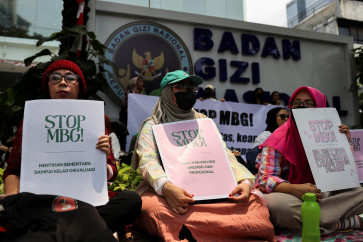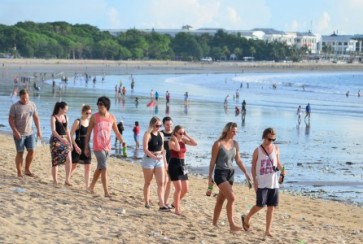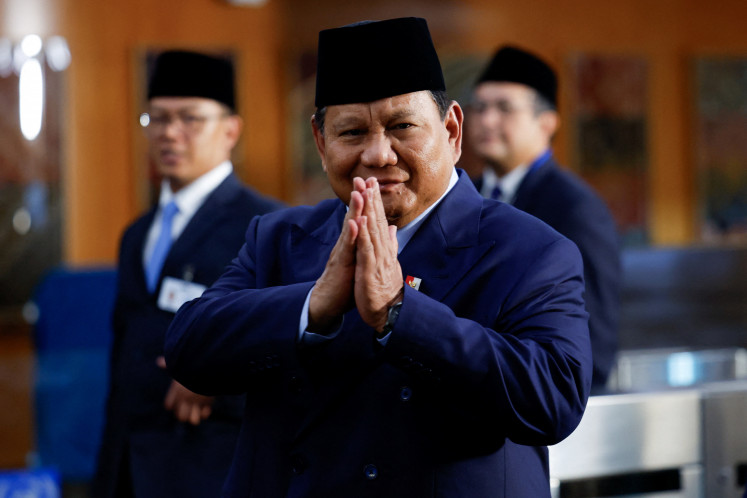Popular Reads
Top Results
Can't find what you're looking for?
View all search resultsPopular Reads
Top Results
Can't find what you're looking for?
View all search resultsASEAN countries share concerns and strategies to fight cancer
In an attempt to forge cooperation among Southeast Asian countries in fighting cancer, health officials from countries in the region launched on Friday a call for better cancer prevention
Change text size
Gift Premium Articles
to Anyone
I
n an attempt to forge cooperation among Southeast Asian countries in fighting cancer, health officials from countries in the region launched on Friday a call for better cancer prevention.
The Jakarta Call for Action against Cancer was declared during the First Policy Roundtable Discussion on Future Access to Cancer Care in ASEAN held by the Health Ministry in cooperation with ASEAN and the ASEAN Foundation.
ASEAN Foundation executive director Makarim Wibisono said the call for action aimed to mobilize countries in the region to develop a more focused policy and strategy against cancer.
“While curative health measures remain our commitment, we want to develop a policy and strategy that focuses more on preventive measures in the fight against cancer as it is much more cost effective,” he said.
ASEAN Secretary-General Surin Pitsuwan in a statement called on ASEAN governments to “mobilize their resources and tackle the cancer epidemic before it drains the countries’ already-stretched healthcare facilities”.
Citing data, Makarim said that more than 70 percent of cancer cases in the world occurred in developing countries. “It’s time for us to change our wrong perception that cancer affects only wealthy people. Cancer is now a problem faced by not only more advanced economies, but also developing nations,” he said.
The call for action highlights four issues: health policy, prevention, risk factors and surveillance.
The Health Ministry’s director general for disease control and environmental health, Tjandra Yoga Aditama, said that through the call for action, ASEAN leaders would hopefully have the political will to make cancer an important issue.
“In principle, we want them to highlight the fight against cancer. We are also stressing the importance of strengthening partnerships among the countries in tackling cancer risk factors, such as smoking, as well as working toward a strengthened regional partnership to improve access to affordable but quality treatments for cancer,” he said.
Responding to journalists, Tjandra said that in Indonesia, promotive and preventive health measures were already at the very core of efforts to fight against cancer. Yet, the preventive efforts such as early screening of cervical cancer, regulating smoking and promoting a healthy diet would continue to expand.
“We have developed early screening programs for cervical cancer using the visual inspection with acetic acid [IVA] technique in 28 provinces and some of them, such as Bali, are very active in promoting the screening. The promotion of clinical breast examination [CBE] to detect breast cancer early also continues to expand,” said Tjandra.
According to the World Health Organization (WHO), in 2010, 7.8 million people in the world died of cancer. In 2030, there will be 22 million new cancer cases with more than 13.2 million deaths. By 2015, it is estimated that there will be 1 million new cancer cases per year in ASEAN countries. In Indonesia, 5.7 percent of deaths are associated with cancer.
“If we, countries in ASEAN, can come up with the right policy and strategy in the fight against cancer, you can imagine how many millions of lives will be saved and how much suffering can be eased as we know that most cancers can be prevented as they are the result of our own poor lifestyle choices,” said Health Minister Nafsiah Mboi.
During the discussion, the health minister also praised the Asean Costs In Oncology (ACTION) Study, a region-wide research effort to examine the socioeconomic impact of cancer in ASEAN communities. The study was launched by late former health minister Endang Rahayu Sedyaningsih in December last year.










